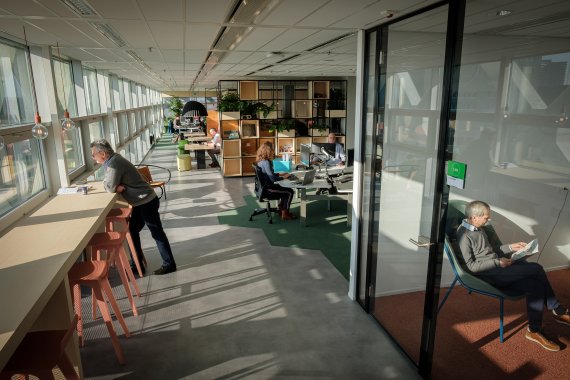The campus is bursting at the seams. To cope with growing student numbers, construction started recently on a third education building. The next step is to deal with the overcrowding on the work floor, in offices and in labs. To this end, an ambitious new plan for the next five years has been launched in consultation with the Science Groups.
Extra lab space
WUR research is flourishing. And that growth is expected to continue for the foreseeable future. A survey by the Science Groups showed that an extra 5500 square metres of lab space will be needed in the next five years. Some of that can be found within the existing buildings. Lecture rooms in Zodiac, Radix and Axis will be freed up when the new education building is ready. But that is not nearly enough.
So a new research building is needed. This premises will probably be located on the edge of the campus to the east of the Bornsesteeg near the carpark, says the Executive Board member responsible for the plans, Rens Buchwaldt. The building will be multipurpose and available to various Science Groups. The Group with the biggest shortage of space is Agrotechnology & Food Sciences, at Food & Biobased Research in particular.
The intention of myWURspace is to offer you the space to do your work as pleasantly and as well as possible
Rens Buchwaldt, Executive Board member

New office concept
The overcrowding in offices is not going to be solved with a new building but with a thorough makeover of the existing ones. The new office concept MyWURspace has been developed to achieve this (see too page 20). It is actually a revamped version of the open office idea that was launched on campus 10 years ago, in Actio among other places. So MyWURspace is not entirely new. WEcR in The Hague and its Wageningen branch on the fourth floor of Atlas are already set up along these lines.
The core of the concept is that work spaces should be suited to the various activities people engage in during the course of the day. ‘The intention of myWURspace is to offer you the space to do your work as pleasantly and as well as possible,’ says Buchwaldt.
In specific terms, this spells the end of a permanent desk of your own, or even a fixed building to work in. Buchwaldt: ‘Work is changing all the time. Collaboration is playing a bigger and bigger role. We are working less individually and more with other people and other Science Groups. And new, young people work differently and require a different office environment.’
The concept, as part of the overall vision of building use, will be discussed with the WUR Council in the coming months. Buchwaldt aims to start implementing it after the summer.

 MyWURspace on the fourth floor of Atlas. Photo: Guy Ackermans
MyWURspace on the fourth floor of Atlas. Photo: Guy Ackermans